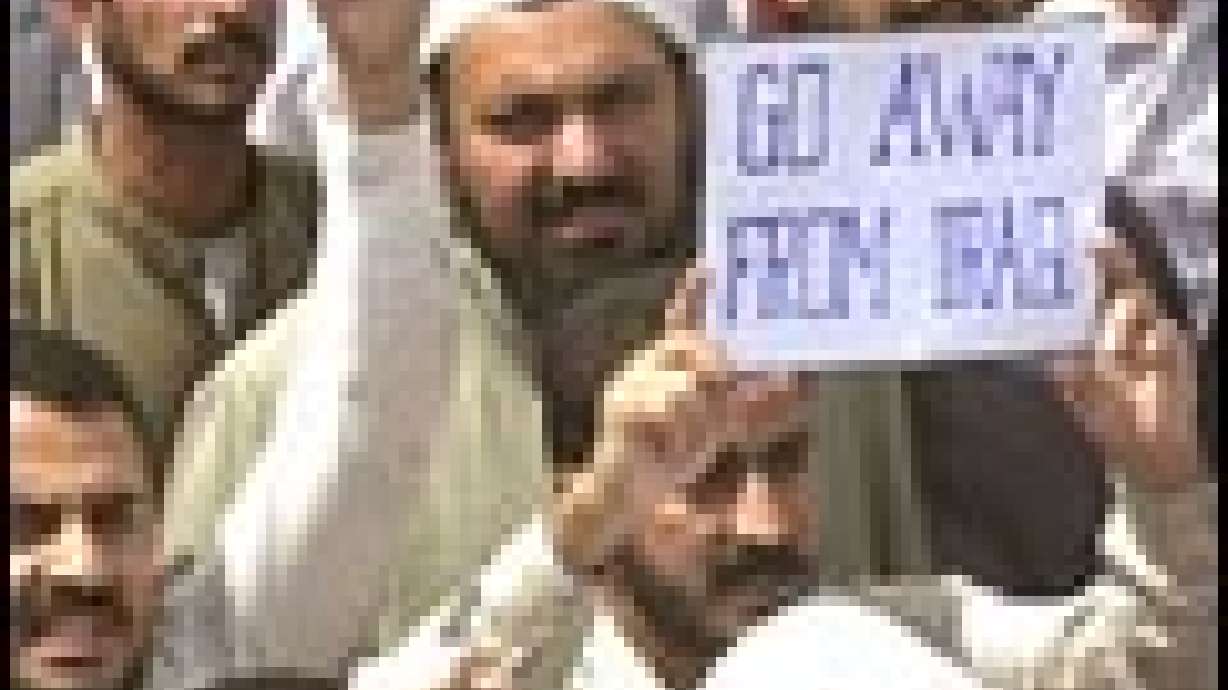Estimated read time: 3-4 minutes
This archived news story is available only for your personal, non-commercial use. Information in the story may be outdated or superseded by additional information. Reading or replaying the story in its archived form does not constitute a republication of the story.
BAGHDAD, Iraq (AP) -- Thousands of Iraqis demonstrated against the U.S. occupation of Iraq on Friday, the second Muslim day of prayer since the regime's collapse.
In the center of the city, the Ministry of Information was in flames, apparently ignited by looters. Soldiers surrounded the 10-story building as looters tried to carry away a few last prizes. A recording played over Army loudspeakers, warning people in Arabic to leave the area "immediately or there will be consequences."

At morning prayers, Sheik Ahmed al-Kubeisy rejected the troops' "occupation" and said American soldiers should leave the country soon, before Iraqis expel them, Arab news channel Al-Jazeera reported.
His calls for U.S. forces to leave Iraq drew cheers and chants of "Allah Akbar" (God is great) from worshippers gathered in the Abu Haneefa al-Nu'man Mosque in the Azameyah neighborhood in Baghdad.
Thousands of Iraqis protested the U.S. military presence after the prayers, and called for solidarity between Iraq's Sunni and Shiite Muslims.
In the Baghdad neighborhood of Kazimiyeh, thousands of Shiites turned out for Friday prayers and some shouted Islamic slogans as they left.
Elsewhere, a contingent of five Marines was guarding a looted laboratory near the Ministry of Health for a third day Friday; they said they've been told anyone who enters could catch diseases because of broken bottles. A sign in Arabic warned, "Danger, Danger -- Keep Out. The ground is infected with HIV, cholera, polio and other diseases."
"We've been told not to go in," said Pfc. Ryan Welch, 22, of Dallas. "We're here to make sure it's secured and to make sure that nobody else goes in, either."
Also Friday, opposition leader Ahmad Chalabi and his Iraqi National Congress followers set up makeshift headquarters at two neighboring social clubs in the affluent Mansour district, guarded by U.S. armored vehicles and elements of the new Free Iraqi forces. Ousted President Saddam Hussein's sons, Oday and Qusai, once belonged to the clubs.
The lack of basic services such as power, water and police protection has hobbled the city's economy and fueled a mixture of rage and resentment against American forces. Iraqis are angry that U.S. troops rarely assume the role of police and resentful when they do.
Bandits have ransacked libraries, museums, government buildings hospitals and schools. When thieves blasted into a branch of the al-Rashid Bank on Thursday, outraged residents -- including many who held accounts there -- surrounded them, demanding they hand over the money. U.S. soldiers intervened, firing shots into the air, and a dozen robbers were detained.
Restoring power, the U.S. military has said, is the No. 1 priority for Baghdad. But some residents, weary of guarding their homes and businesses round-the-clock, say they crave law and order even more. Ultimately, electricity and security may be the same thing; water is involved too. Purification plants need power to operate.
"Without power, there is no peace," said Haifa Aziz, manager of a power substation. "For hospitals, for schools, for the people, they need electricity."
Iraqi engineers say they hope to restart the city's biggest power plant by Saturday, which in turn would kick-start the country's largest power plant to the south. If that works, plant workers said Thursday, electricity could be restored to most of the country within 10 days.
Why the lights went out in Baghdad on April 3 is not clear. U.S. Central Command has said it did not target power stations.
Janan Behnam, chief engineer of Baghdad's key power plant, says the problem was breaks in the lines that supply fuel to the plant. Gunshots, not U.S. bombs, shattered the lines -- "a mistake," Behnam said without elaborating. U.S. Army officers confirmed line breaks were the key problem reported to them.
Without the fuel, the plant can produce only one of the seven to nine megawatts needed to power up and get electricity surging. Behnam and his team have worked frantically to overcome problems at the plant, which is held secure by soldiers of the Army's 101st Airborne Division.
(Copyright 2003 by The Associated Press. All Rights Reserved.)









